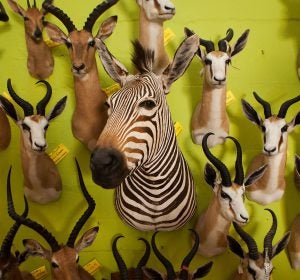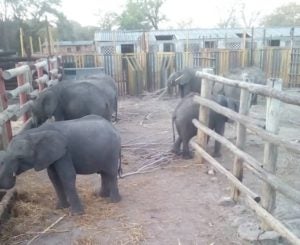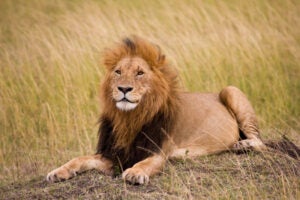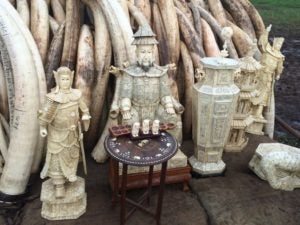
WASHINGTON — Every year, trophy hunters kill tens of thousands of wild animals around the world for fun and bragging rights. Their gruesome quests, some of which can cost hundreds of thousands of dollars, may even involve illegal activities. The trophy hunting industry marginalizes local people and exploits the corruption of government officials. Moreover, the glorification of gratuitous violence through hunters’ social media posts with images of themselves posing with animals they’ve slain belies their conservation claims.
The Humane Society of the United States, Humane Society International and Humane Society Legislative Fund highlight here the “Terrible Ten Trophy Hunting Stories of 2019.”
Both Safari Club International, a primary defender of trophy hunting worldwide, and Donald Trump, Jr., a headliner at SCI’s February 2020 annual convention, made the list.
- At Safari Club International’s annual trophy hunting convention in January 2019 in Nevada, an undercover investigation by HSUS and HSI found vendors peddling captive-bred lion hunts in contravention of SCI’s own policies. Some vendors offered for sale the body parts and products of imperiled species such as elephants and hippos, in apparent violation of Nevada state wildlife trafficking laws.
- In February, Pakistanis reacted with indignation when a video and photos emerged showing an American trophy hunter from Texas, smiling alongside the markhor he paid $110,000 to kill in Pakistan. This imperiled species of mountain goat is Pakistan’s national animal.
- A 2011 video featuring an American trophy hunter from Illinois sneaking up on and killing a sleeping lion in Zimbabwe, surfaced in March 2019. The video shows the man receiving congratulations from his companions as the wounded lion writhed in pain on the ground.
- A trophy hunter covered in blood posed with the mountain lion she had just killed in Colorado.
- South African authorities discovered 108 lions suffering in terrible conditions at a captive-breeding facility that supplies lions for canned hunts in May.
- An American trophy hunter from Kentucky who widely shared photos of a giraffe she had killed in 2018 re-ignited controversy and headlines in June 2019, when she bragged about her kill and stated in an interview that the giraffe meat “tasted delicious” and the skin would make fabulous pillows. A 2018 HSUS investigation into the sale of giraffe-skin pillows and other products led New York to recently become the first state in the U.S.— and the world —to ban the trade.
- A Canadian couple who posted a photo of themselves in July kissing over the dead lion they’d just killed in South Africa demonstrated their remorseless killing of an animal threatened with extinction. The lion allegedly came from a captive breeding facility.
- In September it was reported that the Trump Administration allowed a Michigan trophy hunter to import parts of a critically endangered black rhino he paid $400,000 to kill in Namibia.
- In December, ProPublica released the news that Donald Trump, Jr., known for his trophy hunting, had killed an imperiled argali sheep in Mongolia without a permit earlier in the year. Trump, Jr., is the scheduled keynote speaker at the February 2020 Safari Club International convention, which will auction off a trophy hunting trip with him.
- Two people in charge of a hunting party that killed five elephants in Botswana had their hunting licenses revoked by the government. Because the killing of collared animals is not permitted in Botswana, the hunters destroyed one elephant’s collar to hide the evidence of their crime.
Kitty Block, president and CEO of the Humane Society of the United States said, “Killing magnificent wild animals for fun and social media bragging is not only wrong, but a serious detriment to conservation that undermines federal and international wildlife protection measures. We must all move beyond such violence, which is driving rare and treasured species to extinction.”
The three groups encourage the public to contact their Members of Congress to support H.R. 4804, the ProTECT Act of 2019 (Prohibiting Threatened and Endangered Creature Trophies Act) which would amend the Endangered Species Act to prohibit taking endangered or threatened species into the United States as trophies as well as the importation of any such trophies into the United States.
Media contacts:
The Humane Society of the United States/Humane Society Legislative Fund:
Rodi Rosensweig, 203-270-8929, RRosensweig@humanesociety.org
Humane Society International:
Nancy Hwa, 202-676-2337, nhwa@hsi.org
-30-
Founded in 1954, the Humane Society of the United States and its affiliates around the globe fight the big fights to end suffering for all animals. Together with millions of supporters, the HSUS takes on puppy mills, factory farms, trophy hunts, animal testing and other cruel industries, and together with its affiliates, rescues and provides direct care for over 100,000 animals every year. The HSUS works on reforming corporate policy, improving and enforcing laws and elevating public awareness on animal issues. More at humanesociety.org.
Humane Society International and its partner organizations together constitute one of the world’s largest animal protection organizations. For more than 25 years, HSI has been working for the protection of all animals through the use of science, advocacy, education and hands on programs. Celebrating animals and confronting cruelty worldwide – on the Web at hsi.org.
The Humane Society Legislative Fund is a social welfare organization incorporated under section 501(c)(4) of the Internal Revenue Code and formed in 2004 as a separate lobbying affiliate of The Humane Society of the United States. The HSLF works to pass animal protection laws at the state and federal level, to educate the public about animal protection issues, and to support humane candidates for office. Visit us on all our channels: on the web at hslf.org, on our blog at animalsandpolitics.com, on Facebook at facebook.com/humanelegislation and on Twitter at twitter.com/HSLegFund.




